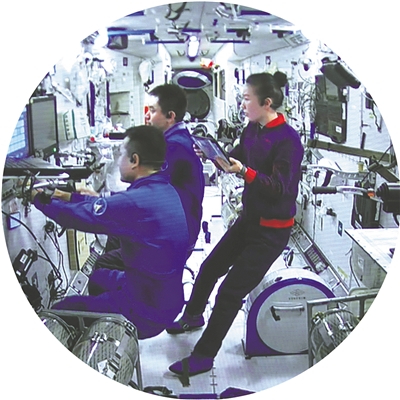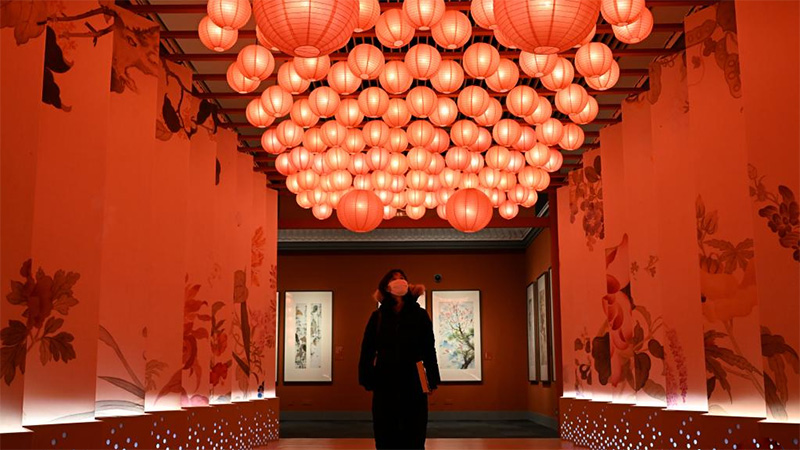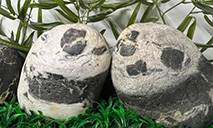Chinese astronauts enjoy many comforts aboard space station during a fruitful three months
Chinese astronauts (or taikonauts as they’re known locally in China) Zhai Zhigang, Wang Yaping, and Ye Guangfu have successfully completed a series of tasks including two extravehicular activities (EVAs), or spacewalks, in-space experiments, and a live science lecture from outer space, all while enjoying comfortable lives inside China’s Tiangong space station for more than three months.

Screen image taken at the Beijing Aerospace Control Center shows the Shenzhou-13 astronauts in China’s space station core module controlling the Tianzhou-2 cargo craft. (Photo/Xinhua)
On Oct. 16, 2021, the three taikonauts blasted into space onboard the Shenzhou-13 spaceship and entered the space station for a six-month stay, embarking on the country’s longest crewed mission for space station construction.
The Shenzhou-13 crew members conducted their first EVAs on Nov. 7, 2021, during which Zhai and Wang stepped out of the space station core module Tianhe while Ye assisted the EVAs from inside the station. It was the second time for Zhai to perform EVAs, following his first time 13 years ago. Meanwhile, Wang, the first Chinese woman to have boarded the space station, became the first Chinese female astronaut to walk in space, making history for female taikonauts.
During their 6.5-hour long mission, they performed a series of extravehicular tasks, including installing a dual-arm connector (a device linking the space station’s big and small mechanical arms) and a suspension device.
On Dec. 27, 2021, the team performed EVAs for the second time, with astronauts Zhai and Ye venturing out of the space station and Wang staying inside to support her crewmates to complete their operations. It was the third time for Zhai to perform EVAs.
The second round of EVAs by the Shenzhou-13 crew members lasted for six hours and was a complete success, which further tested coordination capabilities between space and Earth, along with the coordination between the taikonauts and the space station, in addition to the extravehicular spacesuits.
The three astronauts delivered a wonderful 60-minute science class inside the space station to students on Dec. 9, 2021. The lecture was the first one conducted by Chinese astronauts from China’s space station. They told students how they go about their daily lives and work on the space station and demonstrated experiments in the weightless environment while in outer space.
On the first day of 2022, the trio held a video chat with students, sharing their space dreams and aspirations. During the video talk, the astronauts showed viewers on Earth around a painting exhibition inside the space station. About 20 paintings drawn by teenagers from central and western China were displayed during the exhibition.

Screen image taken at Beijing Aerospace Control Center shows Chinese astronaut Zhai Zhigang waving his hand after completing extravehicular activities (EVAs). (Photo/Xinhua)
On Jan. 8 this year, the Shenzhou-13 astronauts inside the space station core module completed a manual rendezvous and docking experiment with the Tianzhou-2 cargo craft.
On Jan. 15, Wang made history again, becoming the first Chinese female astronaut to stay in orbit for more than 100 days.
The three astronauts may have escaped Earth’s gravity, but one chore has nonetheless followed them into orbit onboard the space station – housework, including cooking and cleaning.
Thanks to a range of high-tech facilities adopted in the Tianhe space station core module, the lives of the Chinese astronauts have been made much easier.
Tianhe is equipped with air conditioners to ensure that the air temperature and humidity levels are appropriate for those onboard. A fridge in the core module ensures that the astronauts can choose from many types of fresh fruits, such as apples and bananas.
The air purification system inside the space station guarantees the continuous supply of fresh air for the astronauts. High-tech vacuum storage bags have also been prepared for them to safely store waste. All waste items are classified and carefully collected in a device designed for this purpose.
The trio can trim their hair aboard the core module thanks to clippers that are attached to something that operates similar to a vacuum cleaner, which can collect all the trimmings while cutting hair.
The taikonauts can also enjoy some leisure activities after work, like reading, listening to music, and watching episodes of various shows. Meanwhile, they can make video calls in the space station with their family members thanks to instant access to mobile terminals.
Photos
Copyright © 2022 People's Daily Online. All Rights Reserved.










